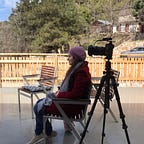From Syria to Lebanon: a hand-stitched journey of growth
On the 11th year mark of the Syrian conflict, Khalil, now residing in Lebanon, looks back at his journey of development despite the devastation. After bearing a leg injury that forced him “to do nothing but eat and sleep,” he was introduced to the colourful world of embroidery at World Food Programme (WFP) supported training sessions.
When Khalil first registered for what he initially thought was a sewing class, he never expected the surprises that would come out of it.
It all started with a simple text message from WFP partner, The Forum for the Rights of Persons with Disabilities (FOH), announcing multiple online training sessions with the aim of empowering people with disabilities through equipping them with income generating skills.
To Khalil’s shock, the ‘sewing’ class he registered for was actually an embroidery class. To some this might not be significant, but for Khalil, embroidery was considered an “activity exclusively for women” that he did not think would ever suit him.
After conversations with his brother, who encouraged him to try it, he eventually attended class. To his surprise once again, Khalil soon discovered he was the only man: his peers and instructors were all women. After spending the last six years living at home, isolated from the world, Khalil was not accustomed to interacting with women outside home.
Khalil, like many others, was living in Syria when the conflict broke. Back in 2013, he suffered from an injury in his leg that rendered him on crotches. Having worked in concrete prior to his injury, this was no longer a viable career for him. Khalil, along with his brother eventually sought refuge in Northern Lebanon where they remained since. The difficult economic situation in the country, along with Khalil’s injury, prevented him from finding a stable job and eventually leaving the house.
According to recent WFP findings, half of the Syrian refugees in Lebanon are food insecure. Most refugees continue to resort to negative coping strategies to survive, such as borrowing money, sending kids to work, or not paying rent. As a response to growing needs, WFP is supporting more than 1.1 million Syrian refugees in Lebanon every month through much needed cash assistance and interventions that build skills.
“Before joining this training programme, all I did during the day was eat and sleep,” Khalil explains. “My life has now drastically changed. I went from not working for almost six years, to finally being productive and selling products done by my own two hands.”
The FOH and WFP have been teaching all types of basic skills that people with mental and physical disabilities could benefit from. Classes range from makeup, food hygiene, basic accounting, to household budgeting, and embroidery.
Now, Khalil uses the Internet to further explore the world of embroidery and learn new techniques on his own. As he dived deeper into this world of colours and patterns, he became more entranced with his curiosity to learn. Khalil also went on to find a job in a local market. It allowed him to further connect with people and build life lasting friendships.
WFP’s livelihood projects equip participants with vital skills that boost their livelihoods. In exchange for their work, participants are supported with an e-card that helps them buy nutritious food. Designed in collaboration with local authorities, such projects create common ground for people from diverse backgrounds who find themselves grouped together, be they refugees from Syria or Lebanese, breaking social barriers in the process.
In coordination with the municipality of Syr, Donniye, and through support from WFP, FOH was also able to build ramps and rails in front of public organizations in the greater area of Donniye and Tripoli.
“The purpose of these renovations is to have people with disabilities feel respected when they visit public places. They should not have to go through the embarrassment of asking others to help them up the stairs,” says Reem, a Monitoring and Evaluation Officer at the forum. “We want people with special needs to be independent, to be capable,” she explains.
As for Khalil, his love for embroidery lives on. As he reflects on his experience, he recalls his father’s advice. “Always pursue an education, even if at the ends of the earth,” he explains. “Nothing you learn will hurt you, everything you learn is to your benefit.”
